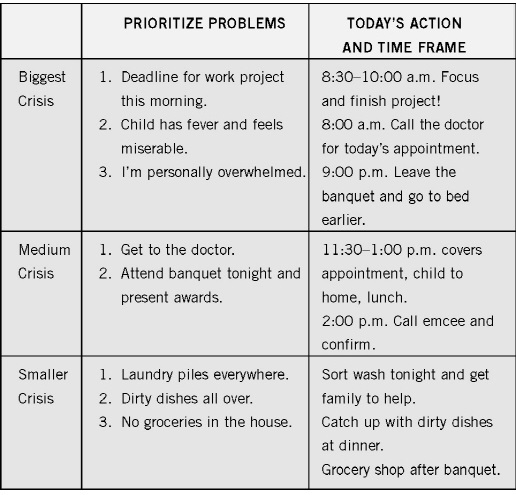

Formulate and stamp indelibly on your mind a mental picture of yourself as succeeding. Hold this picture tenaciously. Never permit it to fade. Your mind will seek to develop the picture. . . . Do not build up obstacles in your imagination.
—Norman Vincent Peale
There are times in life when everything is going well. And then comes the day when you wake up and everything you attempt seems to fall apart. Jan called me after she had one of those days.
“I couldn’t believe it. I thought I had a good rhythm in my life, but I had an uneasy feeling I was getting behind. At work, my in-box was higher than normal, my teenagers were a little edgier than usual, and my husband was busy doing his own thing.
“Then Monday I woke up late and didn’t have a chance to get anything ready for the day. I had to wash some silverware by hand in order to eat breakfast since I skipped doing dishes for two days. I had to wear a wrinkled blouse since I didn’t have time to iron. My daughter woke up sick just when I was ready to leave. Ugh. I was behind before I started. And I had a report due at work that I meant to finish early.
“I felt so overwhelmed that I wanted to quit my job. It’s been a long time coming, but yesterday it really hit. What should I do?”
Untangle Stress
Jan was desperate to get back on track, but there was no letup in her schedule until the weekend, and that was three days away. The mound of to-dos piled up, there was no peace at home, and work wasn’t going well either.
A time crisis will often turn into an emotional crisis if you don’t stop, breathe deeply, and take stock of what you need to adjust. Let’s take a look at some practical steps.
Being overwhelmed also has its benefits. It can bring clarity to your life. Stress can cause you to sit in self-pity or rise up and conquer. It can be an excuse to collapse or a chance to overcome the impending time deadlines. It can cause you to slack off and give up, or change the course of your day with a new plan.
I urge you to welcome the time crunch and consider it an opportunity to crystallize what’s really important.
What’s Absolutely Necessary?
A time crisis causes you to ask three key questions to move out of the zone of being overwhelmed:
1. What absolutely has to be done?
2. When can I do it?
3. How can I squeeze it in?
Write down the tasks that are troubling you. If you can put them in categories, so much the better. For example, Jan wrote:
Work Crisis:
 Got report in late today.
Got report in late today.
 Boss isn’t happy with me.
Boss isn’t happy with me.
 In-box is overflowing.
In-box is overflowing.
 Desk and office are a mess.
Desk and office are a mess.
 Stressed out all day and getting nothing done.
Stressed out all day and getting nothing done.
Home Crisis:
 Daughter woke up sick and needs to get to the doctor.
Daughter woke up sick and needs to get to the doctor.
 Dishes and laundry are piled up beyond normal.
Dishes and laundry are piled up beyond normal.
 Bills and paperwork are getting out of control.
Bills and paperwork are getting out of control.
 The clutter is driving me crazy.
The clutter is driving me crazy.
Jan was about to stop there, but I pushed her further. “What about you? How are you feeling about all this?” I asked. “Maybe you’re in crisis too.”
She responded with a sigh and dropped her head. After she paused, she added to the list.
Personal Crisis:
I can’t keep up and I feel overwhelmed!!!
Plan Your Work and Work Your Plan
Jan and I put together a plan. Then I encouraged her not to push herself over the edge. “Make a plan for today,” I suggested. “Then get some sleep and regroup early in the morning for tomorrow. Taking it one day at a time means choosing the right priorities each day until you’re back on track.”
After reviewing her crisis lists, she decided to put her problems in order for that day and add a time frame for each one.

Jan admitted that things had gotten out of control lately, which can happen to anyone. In the crisis moment, her priorities became clear: family first, work second, and herself last. But she was looking forward to dinner out Friday night and sleeping in on Saturday to include some time for herself.
“That’s fine as long as you keep noticing when you’re skimming and start to accumulate a backlog. That’s where problems develop like now,” I told her. “I’m sure this is temporary, but let’s look at two other ways to prioritize.”
Prioritize a Crisis: Time Order or Priority Order
In a crisis time it is important to immediately think clearly or even write down “What is the next action in this crisis?” The two ways to do that are Time Order or Priority Order which keep you from helter-skelter activity.
Time Order walks you successfully from one step to the next to complete a long list. For example, Jan needed to get a doctor’s appointment first, write and turn in the important report second. While waiting at the doctor’s office, she could call about the banquet. And later she could stop by her office to handle her in-box and e-mail.
Time Order at Work
1. Call doctor.
2. Do report.
3. Call re: banquet.
4. Go through in-box.
Priority Order shows you what to accomplish next but without a time frame. In Jan’s case, after work she could shift gears at home and easily follow the Priority Order tasks to pick up groceries, wash the dishes, finish the laundry in progress, and finally sit down with a clear mind to do paperwork. Soon things will be back in order and her daughter well again.
Priority Order at Home
1. Groceries
2. Dishes
3. Laundry
4. Paperwork
Move from Stress to Rest
I talked with Jan a week later. “Once I got my work report finished,” she said, “my daughter started to recover, and I got through the big banquet. Everything else fell into place too. The house is gradually getting under control again, and I feel so much better. Prioritizing and tackling the hard things first worked well.”
It’s Your Time
Overcome When You’re Overwhelmed (Time Skill #5)
When I’m overwhelmed, I know I need to do the following:
■ Cut back on my schedule.
■ Ask my family and friends for extra help.
■ Lower my expectations.
■ Other ____________________
Obstacles cannot crush me. Every obstacle yields to stern resolve.
—Leonardo da Vinci